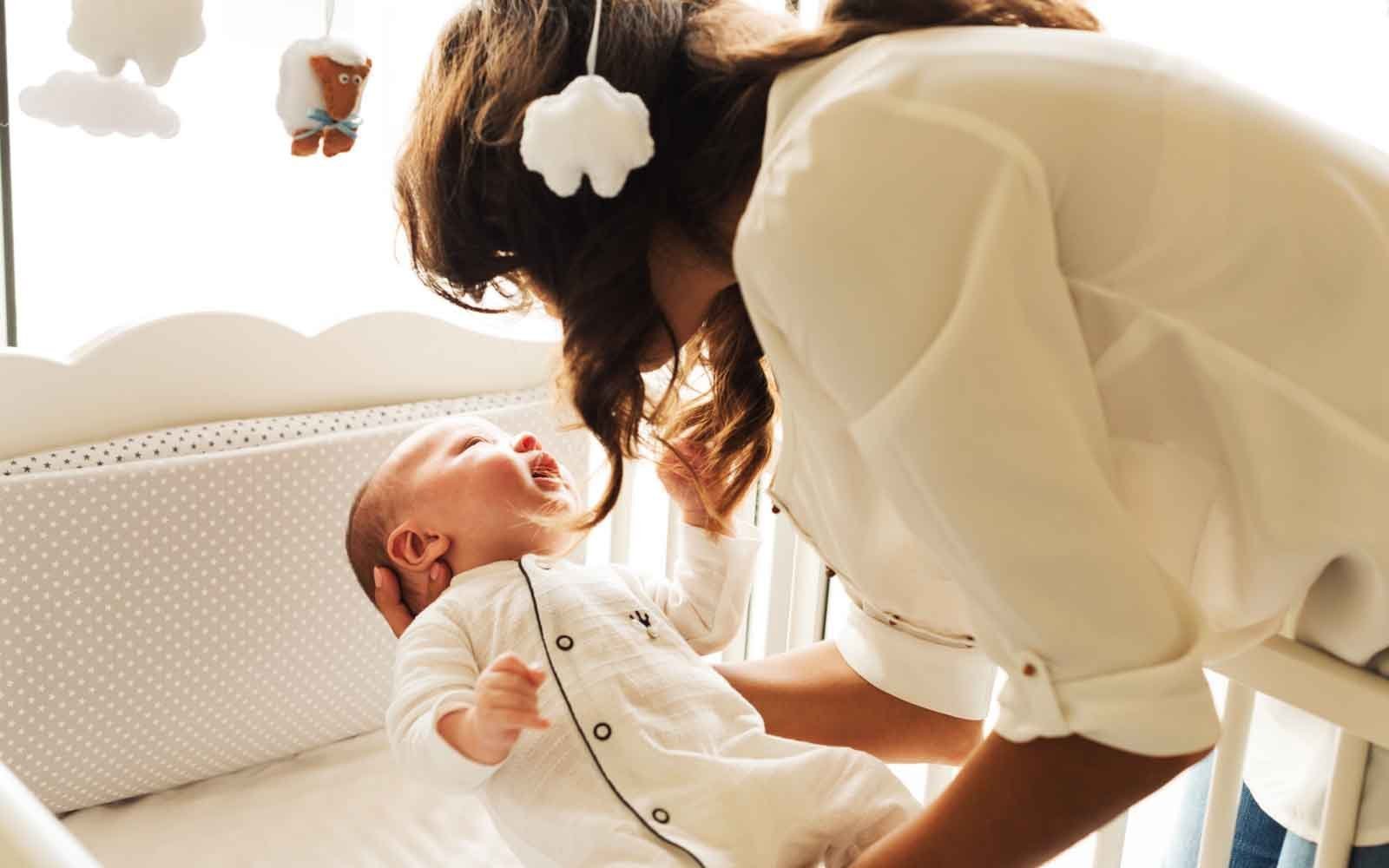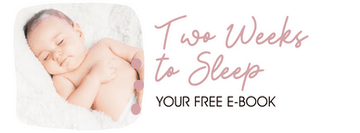
WAKEY WAKEY! Why waking your baby can lead to MORE sleep...
The idea that you mustn’t wake a sleeping baby, EVER, runs on the assumption that all babies, of any age, are skilled enough in sleep to be in absolute control of the precise number of their own nap hours.
Sadly, this isn't true for the vast majority of babies.
Babies take a while to learn the skill of sleep, much like an older child is going to take a while to learn to read. They’re not born automatically knowing the difference between day and night. They don’t know how to regulate their own nap/sleep hours or establish and maintain a circadian rhythm.
Babies (all humans, in fact) rely on zeitgebers (rhythmically occurring natural events which act as a cue in the regulation of the body's circadian rhythm) and their own body clock doesn't start properly functioning until beyond 8 weeks old. Like reading, they need us to coach them as they develop these skills.
In this article:
- Why wake your baby?
- How waking your baby can help them to get MORE sleep
- Times when you might need to wake your baby
Feeling confused about your baby's sleep needs?
Let our sleep experts help you every step of the way. Together we can solve your little one's sleep challenges
Choose your Sleep Solution
Why wake your baby?
Some babies would happily sleep the day away; these same babies will then want to stay up all night long because they’ve already met their daily sleep needs and it is likely they missed some feeds during their sleepy day which they’ll need to make up for in the night.
Waking our babies helps teach them how to regulate and consolidate their own sleep, establishes their circadian rhythm and reinforces the difference between daytime and nighttime sleep.
But first, let me clarify "waking"... we're not talking about all the time or every nap or during the night!
When we refer to waking your baby it's usually to start the day at a consistent time (much like how you aim for a consistent bedtime) at say 7am, or to maintain a specific morning nap length, enabling a longer, more restorative lunch nap, or to cap a late afternoon nap which risks ruining bedtime, or in a transition period when babies are about to drop a nap.
How waking your baby can help them to get MORE sleep
But, you say, my baby must need the sleep, right? Yep, absolutely right! They do need the sleep… But they don’t necessarily need it all during the day, when sleep is less restorative than during the night.
A lot of the time, negativity around waking your baby is because people just don’t know the actual reasoning behind it (or it’s effectiveness!) and “waking the baby” somehow sounds so counter-intuitive. What people might not understand is that the science behind this is that babies have a very specific number of sleep hours they'll do over a 24-hour period; it's not as simple as looking at day sleep and night sleep in isolation from each other.
In order to aim for a 12-hour sleep period overnight (or thereabouts, allowing for feeds with younger babies), the logic tells us that your baby then needs X amount of sleep hours in the day to make up the 24-hour quota for their age. If your baby has MORE daytime nap hours than this, they will sleep less at night because they've simply already had enough sleep within that 24-hour window. This would cause a baby to:
- wake multiple times a night.
- stay awake for long periods in the night.
- wake early in the morning and not go back to sleep.
- be difficult to settle at bedtime or overnight.
Having a solid, uninterrupted night sleep is when your baby does most of their growing and developing. This is the same for any human - young or old. Babies sleep cycles are longer in the night than in the day and they are sleeping their deepest between bedtime and midnight. Babies having a broken night’s sleep due to them having had too much day sleep (among other things) is going to be detrimental, not restorative.
There is nothing wrong with wanting your baby to have the best chance to sleep well overnight when sleep is going to be the most beneficial to them. The by-product of this is of course that you end up sleeping well too - and what baby doesn’t want a happier, well-rested parent?!
Times when you might need to wake your baby
As with night sleep, there is a specific window in the day when sleep is also going to be the most restorative for your little one: that is between 12:00pm - 2:00/2:30pm. This is a natural sleep window in all humans - adult and child alike. This is the time of day when we have our lowest energy levels as dictated by our circadian rhythms, so it will be easier for us to fall asleep and stay asleep within this period.
Say goodbye to sleepless nights.
Join over 800,000 families worldwide who are enjoying excellent sleep with our Sleep App, created by experts in the field of pediatric sleep.
Choose your Sleep Solution
If a baby sleeps for too long in the morning nap, can’t self-settle (for babies older than 4 months), hasn't been awake long enough since their last nap or are overtired, they won’t want a decent 2-2.5 hour sleep in this crucial window.
The length of the morning nap has a massive impact on the rest of your baby's naps that day. A shorter morning nap which allows for a good long lunch sleep will lead to a well-rested and settled baby come bedtime.
A long morning sleep will result in your baby only wanting to sleep for shorter periods throughout the rest of the day and they will become cranky and difficult to settle at bedtime from a build up of over tiredness. A too-long morning nap can also end up causing and reinforcing an early morning waking habit. So you can see how it all links together - it’s a real knock-on effect! Being more in control of your baby's nap hours is an important part of the process.
The backbone of our Sleep Programs is this 2-hour lunch nap. This nap stays the same for babies and toddlers of all ages and is designed to coincide with that natural dip in energy levels we all have between those midday hours. We have seen that by having more of a handle on your baby’s nap times and lengths, their days and nights gel together much smoother and you have a happier baby (and mum) for it!
Let's get your little one's sleep sorted ASAP!Our award-winning Sleep App will solve your baby's sleep challenges in no time.
Choose your Sleep Solution
And so, we sometimes have to wake our babies. Gently. Maybe once or twice a day, to keep them on the right nap path. Usually opening the curtains or turning off the white noise is enough.
If you are happy to let your baby sleep for as long as they want during the day, and I know many many people are, that’s absolutely fine!
If however, your baby is doing any of these things: waking for long periods or multiple times in the night, being difficult to settle at bedtime or overnight, waking early in the morning - it might be a good time to think about helping them regulate some of their naps. This information, and tonnes more, is fully detailed in our comprehensive, age-appropriate Sleep Programs.
___________
Bibliography
Burnham, Melissa M et al. “Nighttime sleep-wake patterns and self-soothing from birth to one year of age: a longitudinal intervention study.” Journal of child psychology and psychiatry, and allied disciplines vol. 43,6 (2002): 713-25. doi:10.1111/1469-7610.00076
Kitsaras, George et al. “Bedtime routines child wellbeing & development.” BMC public health vol. 18,1 386. 21 Mar. 2018, doi:10.1186/s12889-018-5290-3
Horváth, Klára, and Kim Plunkett. “Frequent daytime naps predict vocabulary growth in early childhood.” Journal of child psychology and psychiatry, and allied disciplines vol. 57,9 (2016): 1008-17. doi:10.1111/jcpp.12583
Tham, Elaine Kh et al. “Infant sleep and its relation with cognition and growth: a narrative review.” Nature and science of sleep vol. 9 135-149. 15 May. 2017, doi:10.2147/NSS.S125992
Galland, Barbara C et al. “Anticipatory guidance to prevent infant sleep problems within a randomised controlled trial: infant, maternal and partner outcomes at 6 months of age.” BMJ open vol. 7,5 e014908. 2 Jun. 2017, doi:10.1136/bmjopen-2016-014908
Mindell, J. A., Leichman, E. S., Composto, J. , Lee, C. , Bhullar, B. and Walters, R. M. (2016), Development of infant and toddler sleep patterns: real‐world data from a mobile application. J Sleep Res, 25: 508-516. doi:10.1111/jsr.12414
Molfese, Victoria J et al. “Relations Between Toddler Sleep Characteristics, Sleep Problems, and Temperament.” Developmental neuropsychology vol. 40,3 (2015): 138-54. doi:10.1080/87565641.2015.1028627
Newborn Sleep Patterns, Johns Hopkins Medicine
Healthy Sleep Habits, Johns Hopkins Medicine
Touchette É, Petit D, Paquet J, et al. Factors Associated With Fragmented Sleep at Night Across Early Childhood. Arch Pediatr Adolesc Med. 2005;159(3):242–249. doi:10.1001/archpedi.159.3.242

Receive product and services updates, promotional offers and other marketing communications based.





